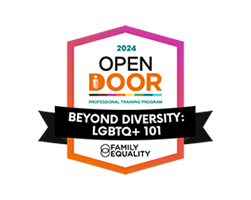Genetic screening is a key component of the egg donation process. It provides intended parents with important health information for their future child and also gives donors insight into their family health history and genetic risk factors they may not have known about previously.
Pamela Callum and her team at Tandem Genetics conduct genetic screening sessions with egg donors on behalf of Egg Donor & Surrogate Solutions. They thoroughly review the donor’s family medical history, looking at three generations, to help identify potential risks to offspring conceived using the donor’s eggs. Her team also reviews the donor’s genetic carrier screening results and summarizes the information.
“I believe it’s important to help intended parents understand what the information means when they are selecting a donor so that they can make the best choices for their family based on the information available,” Pamela says.
We asked Pamela to share more about her work as a genetic counselor and why donor genetic screening is so important.
What is most important for intended parents to know about genetic screening for their egg donor?
Genetic screening of donor applicants helps to identify some but not all possible risks for inherited disorders. There is no way to ensure that anyone’s child will be free of inherited disease.
What are the benefits of genetic screening for the donor-conceived children who are born via egg donation?
Genetic screening can help to identify potential risks to donor-conceived children. Intended parents can have testing on the male partner [or sperm donor] to further evaluate those risks so they can make decisions about managing their pregnancies or using an egg donor.
Additionally, family health history is important for donor-conceived individuals because it can help them manage health risks or concerns that arise in the future. Everyone has limitations in what is known about their family medical history, but the more information available can be useful to managing their health or estimating their potential risks. It can also help answer some of their curiosities about their donor’s origins.
What is most important for egg donors to know about genetic screening?
It’s important to talk to your family members about their health history so that you can provide accurate and detailed medical information on your donor profile. Your personal and family medical history will also change over time. It is important that you inform the donor program about changes in your family’s medical history so that they can keep intended parents informed of any significant information that could be important for their children’s health.
About Pamela Callum
 Pamela has worked in reproductive genetics throughout her career. In 2016, she founded Tandem Genetics, which provides access to telehealth genetic counseling and other clinical services. Tandem Genetics has a team of over 15 genetic counselors that provide nationwide services with a focus on reproductive genetics.
Pamela has worked in reproductive genetics throughout her career. In 2016, she founded Tandem Genetics, which provides access to telehealth genetic counseling and other clinical services. Tandem Genetics has a team of over 15 genetic counselors that provide nationwide services with a focus on reproductive genetics.
Pamela graduated from Mount Sinai School of Medicine with a master’s degree in genetic counseling. She is board certified by the American Board of Genetic Counseling (www.abgc.net). For more information, visit www.tandemgenetics.com
We help Intended Parents Create Happy Families via Egg Donation & Surrogacy with the help of caring Egg Donors & Surrogates.
Donor sibling registry, egg donation process, Egg Donor Solutions, Intended Parents, Why use an agency?, Intended Parent Resources, Intended Parent Webinar, Getting started, Why our agency?, Selecting your donor.






